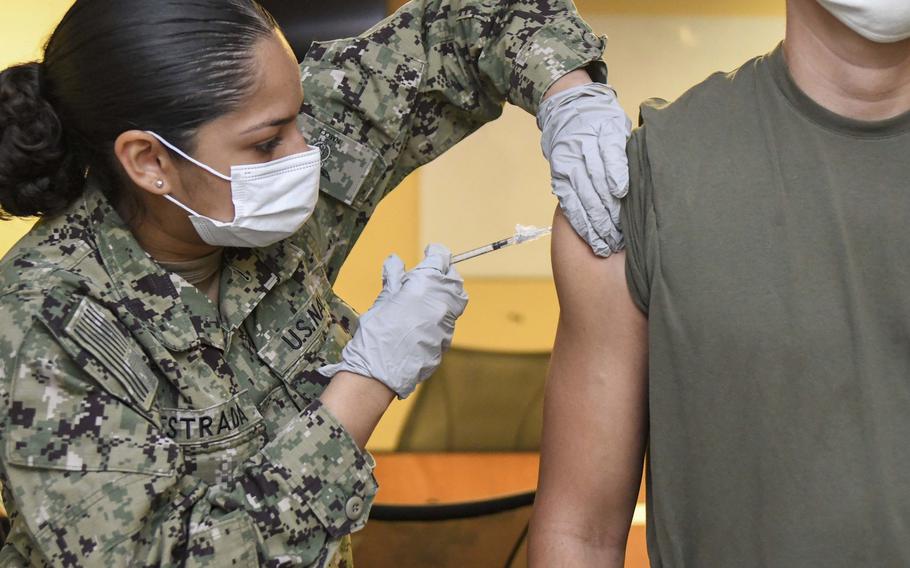
Seaman Denisse Estrada-Suarez administers the Pfizer COVID-19 vaccine to a Marine at Camp Lejeune, N.C., in June 2021. (U.S. Navy)
Male troops experienced heart inflammation at a higher than expected rate after receiving the coronavirus vaccination, but the condition is still so rare that it shouldn’t undermine confidence in getting inoculated, a new medical study found.
The study, published by the JAMA Cardiology medical journal Tuesday, examined 23 cases of male military members who experienced heart swelling after getting a dose of either the Moderna or BioNTech/Pfizer vaccine.
“The observed number of male military members who experienced myocarditis after their second dose of mRNA vaccine, while relatively small, is substantially higher than the expected number,” the journal said.
Myocarditis is typically caused by a viral infection, resulting in inflammation. The condition can hinder the heart’s ability to pump effectively, cause abnormal heartbeats and even lead to a heart attack in extreme cases, according to the Mayo Clinic. Most patients who receive care for the condition quickly recover, according to the Centers for Disease Control and Prevention.
While instances of heart inflammation were higher than expected, the overall occurrence among service members was still characterized as rare.
“Concerns about rare adverse events following immunization should not diminish overall confidence in the value of vaccination,” JAMA reported.
Meanwhile, the risk of developing cardiac problems from being infected with the coronavirus is much greater, with the prevalence of cardiac injury as high as 60% in seriously ill patients, the report said.
“Given that COVID-19 vaccines are remarkably effective at preventing infection, any risk of rare adverse events following immunization must be carefully weighed against the very substantial benefit of vaccination,” it said.
When compared to national averages, it was expected that the 436,000 second doses administered to male troops would result in up to eight cases of myocarditis.
Instead, it resulted in 19 cases among current military members, the report said. The other troops had received their first shot while one other had left the service. The group had an average age of 25.
“Increased attention to myocarditis as a potential adverse event following immunization is warranted,” JAMA said.
Of the 177 million people in the U.S. who were fully or partially vaccinated against COVID-19 as of this month, 616 cases of heart inflammation were reported, the CDC said.
The Military Health Service administered more than 2.8 million total doses of the coronavirus vaccine as of April 30, with only 23 reports of myocarditis, the report said.
Among male service members, myocarditis was observed in 19 of the 436,000 — .004% — who received a second dose of the vaccine during the same time period, it said.
Cardiac symptoms resolved within one week in most of the affected service members.
“Given that COVID-19 vaccines are remarkably effective at preventing infection, any risk of rare adverse events following immunization must be carefully weighed against the very substantial benefit of vaccination,” it said.
Stars and Stripes reporter Karin Zeitvogel contributed to this report.